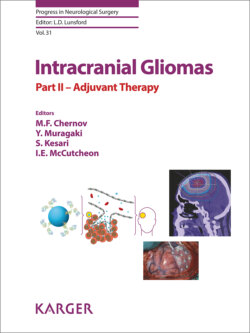Читать книгу Intracranial Gliomas Part II - Adjuvant Therapy - Группа авторов - Страница 31
На сайте Литреса книга снята с продажи.
MGMT
ОглавлениеMGMT encodes a DNA repair enzyme that removes alkylation at the O6 position of guanine, and thus may diminish the effects of alkylating mutagens [67]. Diffusely infiltrating gliomas often have inactivated MGMT due to hypermethylation of its promoter region. This has been identified in 38–89% of DA, 25–86% of AA, up to 100% of OD/AOD, and 32–86% of GBM, especially in sGBM (up to 75% of cases) [5, 12, 13, 36, 37]. This molecular abnormality is thought to occur early in tumorigenesis, before the acquisition of lineage-specific alterations of TP53 and 1p/19q. Detection of MGMT promoter methylation is usually performed with methylation-specific PCR or pyrosequencing. Although use of IHC for assessment MGMT protein expression is possible, its correlation with PCR results and clinical parameters has not been strong [13].
It has been well recognized that MGMT promoter methylation in GBM is associated with improved overall survival and better response to chemoradiotherapy with TMZ [36, 37, 68, 69]. This molecular abnormality also has prognostic significance in cases of AA and LGG [5, 8, 9]. Leu et al. [8] demonstrated that an increase of degree of MGMT promoter methylation by 1% is associated with a decrease of the hazard of death by 1%. However, such prognostic and predictive values may depend on IDH1/IDH2 mutational status [67]. Both molecular alterations are strongly associated in gliomas, and the rate of MGMT promoter methylation is significantly higher in tumors carrying IDH1/IDH2 mutation [5, 8]. It has been suggested that positive prognostic effects of IDH1 mutation predominate in AA, and of MGMT promoter methylation in pGBM [5]. In sGBM the presence of both molecular alterations is associated with the best response to TMZ and longest PFS [34, 67]. Nevertheless, evaluation of MGMT promoter methylation in IDH wild-type HGG may be clinically important, particularly in the elderly patients not eligible for irradiation, since it allows the prediction of the benefit of chemotherapy with TMZ [69].
